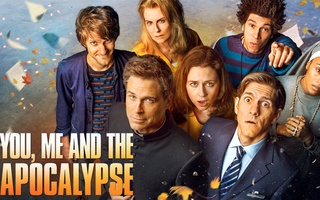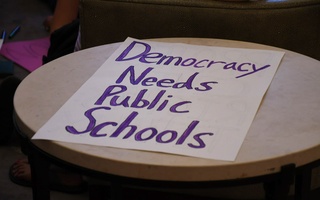My roommate is a member of the Harvard Republican Club. In that context, he had the opportunity last Thursday to meet Betsy DeVos, the Secretary of Education, after her heavily-protested speaking engagement at the Institute of Politics. He later relayed to me that in their brief interaction behind the stage, DeVos seemed less rebuked for her views than disappointed in many of the audience members. This is a poignant criticism of the College. My roommate could tell that she had expected Harvard students to be much more discerning.
That expectation was let down in the IOP last week. As the Secretary came out to speak, large posters were unfurled from the balconies and raised on the forum floor. Now, many of these messages were warranted and appropriate for the occasion: Signs supporting Title IX, messages about public money for public schools, posters proclaiming the importance of not leaving minority students behind. These things left a powerful message.
But many messages were neither warranted nor appropriate. A sign written in large red letters announced “WHITE SUPREMACIST.” And as DeVos was ushered from the room, students shouted that she was what “white supremacy looks like.”
I stand against just about everything Secretary DeVos wants to do with American education. I believe her proposed voucher system would be abused by the rich and would not help our most vulnerable students, many of whom are minorities. I believe the federal government can and should play a constructive, nurturing role educating children, young and old. I believe she is unfit for her job. In many ways I am the prototypical “anti-DeVos.” But, having listened to and attempted to learn from her when she spoke, I believe that she truly does want the best for America and all of America’s schoolchildren—albeit being extremely misguided in her methodology.
Furthermore, I understand that the term “white supremacist” applies to some of the most evil people in this country—people who march with torches, call for genocide, spew hatred at others. The suggestion that Secretary DeVos falls into this category displays a stunning lack of thought about what that title implies. This insulting method of communication as well as some parts of the protest more generally (chanting, booing, making snide comments in the middle of her speech, blocking others’ views and refusing to move) display a shameful disregard of the entire point of Thursday’s event.
The point of Thursday’s event, to paraphrase its moderator Dean Fung, was to engage in a difficult discussion and listen to viewpoints possibly different from our own, understanding that anyone who refuses to listen to such a discussion is under the false impression that they have nothing to learn from those on the other side.
This is not to say that we should refrain from protesting the people and ideas with which we disagree. Indeed, we as engaged citizens are charged with voicing our opinions, and, as Harassment/Assault Law-Student Team co-presidents Sarah B. Gutman and Marielle Sanchez wrote, with not being “complicit” in our silence. And to their credit, Thursday’s protesters did for the most part refrain from disrupting the event to the point that a genuine discussion could not take place for those interested. But just as we are charged with making our voices heard, I believe we are charged with doing so in a way that shows we are informed, intelligent, discerning, and willing to actually hear the views we protest. Really, it comes down to an obligation to thought.
As a Harvard student, I take the latter obligation especially seriously. Members of this institution are always in the gaze of the nation; the way we treat others—especially those with whom we disagree—is noted. The example we provide, for better or for worse, is followed. If we fail even to outline a reasoned argument against a politician’s positions, who will attempt to do the same? Our actions and our ability to listen to and learn from others matter. Likewise, the perceptions others have about us, Harvard students, matter. Even the perception of Betsy DeVos.
Unfortunately, the informed, intelligent opposition that did exist in that forum room was muffled by a less becoming type, one that led to less becoming perceptions. The Secretary’s speech promoting her ideas was met with students I could tell were unwilling to listen to viewpoints different than their own, questions whose askers clearly didn’t want answers, and senseless name-calling equating ignorance with being a white supremacist. In essence, the type of thing that serves only to provide fodder for conservative pundits to tear down an otherwise good cause.
In a response toward the end of the question-and-answer session, DeVos mentioned something to the effect of, “I assure you that I have the best interest of every child at heart.” A woman in the balcony near me snickered, loudly enough for everyone to hear, “THAT’s a stretch.”
The audience erupted into laughter.
I’d say “undiscerning” was about right.
Sam Benkelman ’20 lives in Leverett House.
Read more in Opinion
Science Transcends BordersRecommended Articles
-
 'You, Me and the Apocalypse' a Blast
'You, Me and the Apocalypse' a Blast -
Historian Connects Frederick Douglass to Presidential ElectionDavid Blight, professor of American History at Yale University, connected Frederick Douglass's life and work to the 2016 presidential election at the Harvard Law School Wednesday.
-
Standing Against the Secretary of EducationDeVos’ fundamental lack of knowledge is an imminent danger to schools and students across the country.
-
 Charles Murray, Controversial Alum, Set to Speak at Harvard
Charles Murray, Controversial Alum, Set to Speak at Harvard -
 With Pens and Posters, Students Prepare to Protest DeVos
With Pens and Posters, Students Prepare to Protest DeVos













